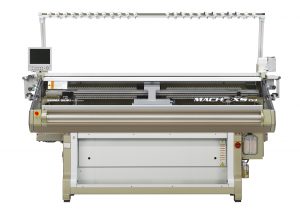 WAKAYAMA , Japan — APRIL 15, 2024 — Textile technology solutions provider SHIMA SEIKI Mfg. Ltd., Wakayama, Japan, along with its Italian subsidiary SHIMA SEIKI ITALIA S.p.A., will be participating in the Techtextil exhibition in Frankfurt, Germany, this month.
WAKAYAMA , Japan — APRIL 15, 2024 — Textile technology solutions provider SHIMA SEIKI Mfg. Ltd., Wakayama, Japan, along with its Italian subsidiary SHIMA SEIKI ITALIA S.p.A., will be participating in the Techtextil exhibition in Frankfurt, Germany, this month.

On display will be SHIMA SEIKI’s MACH2 XS153 15L computerized WHOLEGARMENT flat knitting machine and SDS -ONE APEX4 3D design system.
MACH2 XS features 4 needle beds and SHIMA SEIKI’s original SlideNeedle™, capable of producing high-quality fine gauge WHOLEGARMENT products in all needles. There is great potential for WHOLEGARMENT® knitting in the field of technical textiles, where most items are produced by woven or circular- and warp-knitted textiles using specialized industrial materials that are in many instances very costly. Textile production usually involves knitting or weaving a square fabric or sheet from which 2D patterns are cut and sewn together to make the final product, during which precious material is wasted. In sharp contrast, the WHOLEGARMENT knitting process can produce a complete item in 3D without the need for sewing or linking, and no material wasted.
Through WHOLEGARMENT knitting technology, Shima Seiki therefore offers a sustainable, economical and smarter alternative to current manufacturing processes for technical textiles. In addition, because WHOLEGARMENT® knitting can produce one product at a time, it is possible to perform on-demand production for customized items such as for patient care in the medical field. Examples in technical textiles and industrial materials using flat knitting technology by MACH2 XS and other computerized flat knitting machines in Shima Seiki’s lineup will be on display. These include Shima Seiki’s original samples as well as those by users and other partner companies.

Shima Seiki’s SDS -ONE APEX4 3D design system will be available for demonstrations as well.
Of particular interest should be its ultra-realistic simulation capability that realizes virtual sampling. When countless variations must be evaluated before arriving at a final design, virtual product samples can be used to streamline the decision-making process by minimizing the enormous amount of time, cost and material normally associated with producing actual samples for each variation. When approved, the same data can be converted to machine data for immediate knitting, significantly reducing lead times.
Posted: April 15, 2024
Source: Shima Seiki




